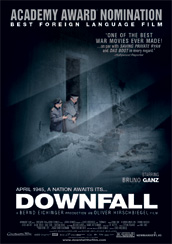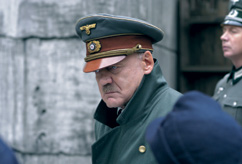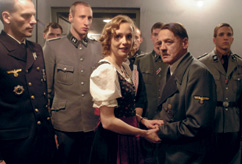Downfall
aka Der Untergang |
| |
 |
German language. Germany/Italy, 2004. Rated R. 148 minutes.
Cast: Bruno Ganz, Alexandra Maria Lara, Ulrich Matthes, Juliane Köhler, Christian Berkel, Corinna Harfouch, Thomas Kretschmann, Heino Ferch, Matthias Habich, Michael Mendl, André Hennicke, Ulrich Noethen, Birgit Minichmayr, Rolf Kanies, Justus von Dohnanyi, Dieter Mann, Christian Redl, Götz Otto, Thomas Limpinsel, Thomas Thieme, Alexander Held, Donevan Gunia, Karl Kranzkowski
Writer: Bernd Eichinger, based on the books Inside Hitler's Bunker by Joachim Fest & Until the Final Hour, by Traudl Junge & Melissa Müller
Original Music: Stephan Zacharias
Cinematography: Rainer Klausmann
Producer: Bernd Eichinger
Director: Oliver Hirschbiegel
LINKS |
Read AboutFilm's interviews with Bruno Ganz & Oliver Hirschbiegel.
 ermans are often accused of being unwilling to confront their country's Nazi past. If that's true, director Oliver Hirschbiegel and his collaborators are not like other Germans. Nazism was an unavoidable subtext in his Das Experiment, a story inspired loosely by the Stanford Prison Experiments (in which ordinary citizens cast as prison guards become sadistic abusers). Now, in the Oscar-nominated Downfall, subtext becomes text. In the first German film to deal directly with Hitler since G.W. Pabst's The Last Act (1956), Hirschbiegel chronicles the last desperate days in Hitler's underground bunker, as the Red Army unrelentingly closes in.
ermans are often accused of being unwilling to confront their country's Nazi past. If that's true, director Oliver Hirschbiegel and his collaborators are not like other Germans. Nazism was an unavoidable subtext in his Das Experiment, a story inspired loosely by the Stanford Prison Experiments (in which ordinary citizens cast as prison guards become sadistic abusers). Now, in the Oscar-nominated Downfall, subtext becomes text. In the first German film to deal directly with Hitler since G.W. Pabst's The Last Act (1956), Hirschbiegel chronicles the last desperate days in Hitler's underground bunker, as the Red Army unrelentingly closes in.
It's April 1945. The streets of Berlin are defended by armed children, and the fate of Nazism is sealed. Yet there is still a human drama to play out. At headquarters, Party leaders and military commanders are at each other's throats. Which of them will stay and face their doom, and who will turn and run? Who, if anyone, will gain some insight, and who will hang onto their delusions until the bitter end?
Some blindly believe Hitler capable of some last-minute miracle. Some want to spirit Hitler away to safety. Some, like Hitler's fiancée Eva Braun (Juliane Köhler), are in a profound, even manic state of denial. Some, like Secretary of the Interior Heinrich Himmler (Ulrich Noethen), want to hold out as long as possible in order to surrender to the western Allies instead of the Soviets. They believe the British and Americans will give them a better deal—maybe even allow them to stay in power as a bulwark against the spread of Bolshevism.

Bruno Ganz as Adolf Hitler in the Oscar-nominated Downfall. |
Hitler (Bruno Ganz), the most delusional of them all, ping-pongs between grandiose visions of a non-existent future and scorched-earth fatalism. At first he moves imaginary troops around a map, then later, as the inevitable sinks in, he agitatedly blames everyone around him for his own collapse. With Albert Speer he discusses ambitious architectural plans, commenting with satisfaction that thanks to the unrelenting bombings, they won't have to go to the trouble of tearing anything down. Speer coldly gives Hitler the advice he wants to hear—that he should stay in Berlin. Is it because the inscrutable Speer finally sees Germany needs to be rid of Hitler as quickly as possible?
There's no good guys here. There's just bad guys, not quite entirely bad guys, and the completely insane. The not entirely bad include Hitler's naïve young secretary Traudl Junge, the self-sacrificing Dr. Ernst-Günter Schenck, and a handful of military commanders who quixotically conduct an impossible defense. They might not merit it, but they earn sympathy by default. These characters are essential to making Downfall bearable for its two-and-one-half hour running time.
Junge, whose extensive interviews are the subject of the recent documentary Blind Spot: Hitler's Secretary, provides the film with a point of view. In the introductory segment she explains via voiceover that she was never an enthusiastic Nazi, but that she was irresistibly drawn to the halls of power nonetheless. She admits, “I didn't say no.” Too many people didn't say no. The film's brief opening, set in 1942, indicts the entire country. It also shows Hitler at a less stressful time, providing a key contrast to the deteriorated Hitler we see in the rest of the film.
Bruno Ganz (star of Wim Wenders' Wings of Desire, Werner Herzog's Nosferatu, and the recent Italian comedy Bread & Tulips) doesn't look much like Hitler, but thanks to a perfect wig and fantastic acting, the differences melt away. In a searing, chilling performance, Ganz does the impossible—finding the human being within Hitler without either whitewashing his evil or crossing into caricature. It was The Last Act that convinced the Swiss actor it was possible to play Hitler as a person and not a parody. To achieve that result, Ganz studied not Hitler's raging speeches, but a unique seven minute magnetic recording of him chatting at a dinner party, made secretly by a Finnish diplomat.
Ganz portrays not Bond-villain madness but true madness, one rooted in deep-seated psychological dysfunctions that hint at an unimaginable personal history. As Hitler, Ganz gives us fatherly kindness toward Junge, heartlessness toward suspected traitors, genuine love for Eva Braun, and all-encompassing rants against generals, Jews, and the German people. When someone begs him to rethink an execution, it is with tenderness and bewilderment that anyone should contradict him that he replies, “But it is my will.”

Eva Braun (Juliane Köhler) and Adolf Hitler (Bruno Ganz) exchange vows as aides look on in the Oscar-nominated Downfall. |
Despite disastrous results, never once does Hitler question himself. Yet his sharply declining health betrays him. His stoop, his dragging leg, his uncontrollably twitching left arm—these cannot be explained solely as the aftereffects of the nearly successful 1944 assassination attempt by German army dissidents. It's as if Hitler's body has been poisoned, manifesting awareness of what he has wrought, even as his mind refuses to accept it.
Surrounding Hitler is the whole cabal of characters from the history books, played by an impressive all-star German cast. Juliane Köhler of Nowhere in Africa and Aimee & Jaguar is Eva Braun. Ulrich Matthes of Winter Sleepers and Aimee & Jaguar is propaganda minister Joseph Goebbels, who is as crazy as Hitler. He brings his fanatical wife Magda (Corinna Harfouch—Eva Blond of German TV's Blond: Eva Blond!) and their six postcard-perfect children into the bunker to await the inevitable. Matthes' Winter Sleepers co-star Heino Ferch (also of The Harmonists) is Albert Speer. Ulrich Noethen (The Harmonists) appears briefly as interior minister Heinrich Himmler. Himmler's self-serving deputy is Thomas Kretschmann, who came to the attention of U.S. audiences in a small but vital role as a German captain at the end of The Pianist. (Interestingly, Kretschmann flatly told AboutFilm at the time that he saw no film industry in Germany; he appears to have reconsidered that opinion.) Christian Berkel of Das Experiment and Safe Conduct plays Schenck, while Alexandra Maria Lara of Naked and The Tunnel is Traudl Junge. The cast is rounded out by a variety of capable television stars and supporting players from German cinema.
A detailed knowledge of history, or even a cursory one, helps keep all the characters straight and fill in the backstory. With such knowledge, you'll know that Downfall is faithful to written records of the events and meticulously researched, right down to the inclusion of the portrait of Frederick II that Hitler keeps in his office. But that knowledge isn't essential. The film's fascination stems from its fly-on-the-wall quality. Hirschbiegel puts you inside Hitler's legendary bunker, recreated in Munich as a claustrophobic set with no removable walls or ceilings. (Exteriors were shot, ironically, in St. Petersburg, with Russian extras playing Germans.) There, you feel privy to mysterious secrets and a monumental unraveling—an unraveling of one of history's greatest evils and of the human beings who perpetrated it. As difficult as the film is, it's impossible to look away. Downfall encompasses so much more than the brief window of time it depicts. Writer/producer Bernd Eichinger put it best when he said, “The final days tell us a lot about how the mass fanaticism functioned in the regime's earlier years and how it continued to reign until the bitter end.”
Hitler's suicide is the high point of Downfall, and so you might tend to feel impatient with the substantial chunk of film that remains. There's a lot left to engage the mind, though, right up to the haunting final image of two seemingly innocent people holding hands—a dramatic, biting comment on the democratic Germany that has followed. Modern Germany is not innocent, Hirschbiegel seems to say. If Germany has not sufficiently wrestled with its Nazi past, this film is a big step toward doing so.
Review
© February 2005 by AboutFilm.Com and the author.
Images © 2005 Newmarket Films. All Rights Reserved.



